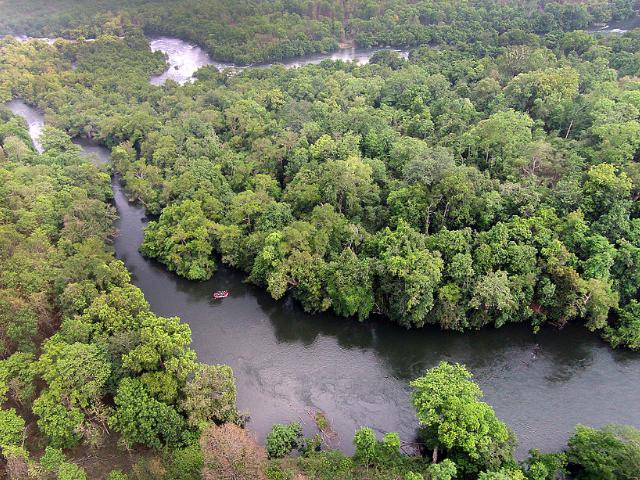Tiger Conservation Of Entire Western Ghats At Stake
The railway project, conceived in 1998, is proposed to pass the forests between two major protected areas — Kali Tiger Reserve and Bedthi Conservation Reserve. More than 80% of the railway line has to pass through the dense forest lands of the Western Ghats, and this entails the diversion of 595 hectares of prime forests which was initially proposed as 965 hectares. Located at the centre of Uttara Kannada district of Karnataka, Kali Tiger Reserve comprises two important protected areas of the region -Dandeli Wildlife Sanctuary and Anashi National Park .And they are contiguous to each other to form a single tract of protected area located in the biodiversity sensitive Western Ghats. Consequently the habitat connectivity between Kali Tiger Reserve and Bhadra Tiger Reserve will be lost and it will have serious implications for long term conservation of tigers in the entire Western Ghat landscape.The project was proposed for transportation of iron and manganese ore and the same can be done through NH-63 which is still underutilised.
Also read: Deadly Train Tracks Threaten Tiger Corridor In MP
UNESCO described the Western Ghats : “Older than the Himalaya mountains, the mountain chain of the Western Ghats represents geomorphic features of immense importance with unique biophysical and ecological processes. The site’s high montane forest ecosystems influence the Indian monsoon weather pattern.” It also said, “Moderating the tropical climate of the region, the site presents one of the best examples of the monsoon system on the planet. It also has an exceptionally high level of biological diversity and endemism and is recognized as one of the world’s eight ‘hottest hotspots’ of biological diversity. The forests of the site include some of the best representatives of non-equatorial tropical evergreen forests anywhere and are home to at least 325 globally threatened flora, fauna, bird, amphibian, reptile and fish species.” Because of diversity and ecological processes that influence the monsoon, the entire catchment of Western Ghat is known to provide water security to peninsular India.
The Plan To Destruct Pristine Forests
The HARP is conceived primarily for the transportation of iron and manganese ores from Bellary- Hospet Region to upcoming two new ports of Tadri (near Ankola) and Karwar on the western coast of Karnataka and to the existing ports of Vasco in Goa. Both Ports are yet to be developed. In 2004, the total project cost was Rs 1153.08 crores which was revised in 2017 to Rs 3,700 crores to be shared on a 50:50 basis between the state government of Karnataka and the Railways. An MOU was signed between the two –the ministry of Railways and Karnataka Rail Infrastructure Development Enterprise (KRIDE), a Government of Karnataka agency.If sanctioned, it would take about 8 to 10 years to implement it. The Railways proposed “mitigation plans “through several underpasses, overpasses and tunnels through which the proposed alignment is likely to pass
Also read: Railways' Push For Tracks in Tiger Reserves Contradicts its Green Claims
“ This is in fact a destruction plan and not mitigation plan”, said a representative of United Conservation Movement, a collective of concerned citizens voicing protest against the HARP. Though over two lakh trees are estimated to be cut for the project, the actual number is likely to be much more, sources said. In an Environmental Impact Assessment report prepared by the Indian Institute of Science Bangalore, the total economic valuation of the forest under proposed project was assessed as Rs 40, 859 lakhs/ha/yr. The project continues to be opposed. Like many others, Karnataka State Board of Wildlife unanimously rejected the proposal in a meeting on March 9 2020. But 11 days later the chairman of the board who happens to be the chief minister of the state reconvened the meeting and the project was cleared on March 20.
Railways' Pending Projects In Tiger Reserves
This is not the first time that Railways have proposed some project right inside pristine forest. In 2019, the Union environment ministry exempted 13 pending railway projects, worth Rs 19,400 crore ($2.8 billion) and spread over 800 hectares of land, from the process of seeking forest permits, according to official documents. These clearances could adversely impact a national park, a tiger reserve, a tiger corridor and wildlife sanctuaries across the states of Uttar Pradesh, Madhya Pradesh, Karnataka and Goa. Despite warning by government appointed experts, the standing committee of the National Board for Wildlife on January 5, 2021 cleared a railway project to double a railway track in the Western Ghats. The project in question is the doubling of the track of the Hospet-Hubballi-Londa-Vasco Da Gama railway line by the Rail Vikas Nigam Ltd (RVNL).
Also read: Tiger Cubs In MP National Park Are Safe, But For How Long ?
The project, sanctioned by the Union Ministry of Railways in 2010-11, involves doubling of the 353-kilometre-long railway track in Karnataka and Goa passing through the Western Ghats. The project is divided into two phases with Phase I covering 252 km between Hospet and Tinaighat and Phase II covering the Tinaighat-Vasco stretch. The phase II involves diversion of 9.57 ha of forest land in the Dandeli Wildlife Sanctuary (in Karnataka) and 113.857 ha in the Bhagwan Mahaveer Wildlife Sanctuary and Mollem National Park (in Goa). Later it was rejected by the Supreme Court appointed Central Empowered Committee. The Dandeli Wildlife Sanctuary is part of the Kali Tiger Reserve.





Presently India is left with just 4% of land area as protected; both state and central government are destroying the PA in name of I'll development. National Board for Wildlife is not interested in protecting our future. Rather it clearing all anti environmental proposals
ReplyDelete